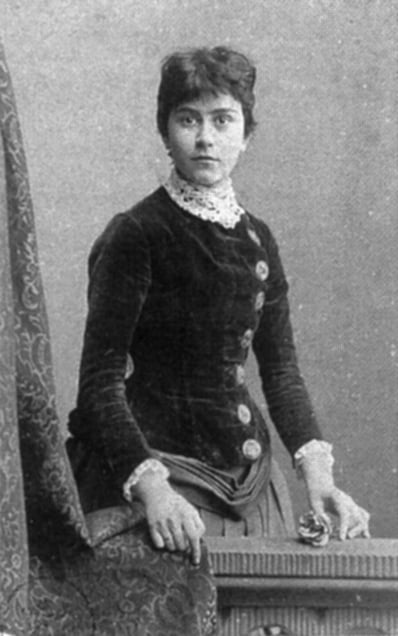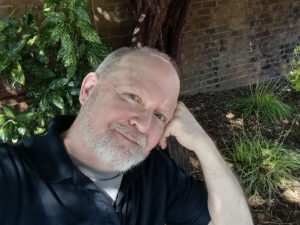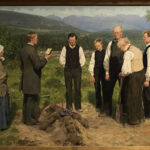She was once a darling of Berlin’s literati, recipient of the prestigious 1932 Kleist Prize for Literature. Now, less than a year later, she is threatened, beaten, and forced out of the city. Her only son is dead, and she is running for her life. Brilliant poet and playwright Else Lasker-Schüler is a Jew in Nazi Germany.
She emigrates to Zurich, then Palestine, “my Hebrew country,” as she calls it. Lasker-Schüler ultimately settles in Jerusalem in 1937. There she forms a literary salon at the French Cultural Center, an artistic gathering called Kraal (Dutch for corral), that opens with Martin Buber on January 10, 1942. Such luminaries as Austrian author Karl Kraus consider her “the greatest poet of modern Germany.” Five-time Nobel Prize in Literature nominee Gottfried Benn goes a step further, pronouncing Lasker-Schüler “the finest lyric poet of the century.” But these distinctions are only part of her life.
Biographers often consign Lasker-Schüler to a single type, suggests Nina Berman with Arizona State University: “Either artist, woman, German, or Jew.” They frequently ignore or explain away complex aspects of grief and spirituality that inform her life. This seems unjust. She was more than a few lines of verse, a gender, a national or ethnic identity.
Born in 1869, Lasker-Schüler was deemed a prodigy by the age of four. Such labels are especially hard on children, who feel constrained to measure up to improbable expectations. She was the youngest of six children. All too soon, grief replaced art as the dominant factor in her life.
Her brother Paul died when she was thirteen. A few months after Lasker-Schüler’s twenty-first birthday, her mother Jeanette passed in 1890, followed by her father Aaron seven years later. Jeanette was to figure prominently in her daughter’s poetry, often addressed directly as “dear Mother.”
On August 24, 1899, Lasker-Schüler gives birth to a son. She names him Paul after her brother. The boy is a child of many gifts. His mother sees in him hope for all that has been blurred and withered in herself, she writes. His playfulness, talent, and candor are to her “a blossom, a breath from God.” Her son’s promise is never fulfilled. Paul dies from tuberculosis at the age of twenty-eight on December 14, 1927. Later, Lasker-Schüler writes this poem of faith and loss:
To My Child You die over and over as the year passes, my child, when leaves flow down and branches grow narrow. Your taste of death was bitter: as with red roses, you were spared no withering blow. And so, endless, I weep . . . in the night of my heart. Still I sigh the lullabies that sobbed you into death’s sleep, and my eyes no longer turn to the world; the green of leaves hurts them so. —yet Eternity dwells in me. My love for you is the one image of God permitted us. Angels wept with me, I saw them in the wind, in the sleet. They floated . . . on the air of heaven. A moon in bloom is like your life, my child. And I dislike the light of carefree butterflies as they pass. I did not foresee death —hunting you, my child— And I love these walls in the room I am painting with your boyish face. These stars, this very month, fall radiant in life to drop heavy on my heart.
Lasker-Schüler’s lament is steeped in desperation, longing, and sorrow. She hints at Paul’s continuing influence in her life. Psychiatrist Karl Goodkin with the University of Miami’s School of Medicine describes these normal aspects of grief as “searching for the deceased, the sense of the deceased being present, and the sense of being in ongoing communication with that person.” Lasker-Schüler infuses her brief lines with undertones of inevitability, resignation, regret, and self-recrimination. Then she surprises us with a source of unexpected hope: Angels wept with me, I saw them in the wind, in the sleet. But such hope does not come easily.
Respected grief experts Robert Neimeyer and David Kessler write in separate books that meaning-making is of paramount importance to parents. It is perhaps their sole means of survival. Most bereaved parents count their child’s death as the single defining moment in their lives. They relate that their personal calendars were reset that day. This has been true for me since my daughter, Jess, died on January 16, 2015. Yet my love for her endures; so, too, does my sorrow, an expression of that love. As with Lasker-Schüler, grief and love now inhabit my life, my decisions, my perspectives, and each word I write.
Lasker-Schüler’s lament for Paul does not speak of healing or recovery; it merely proffers occasional glimpses of relief. This is quite common. For those so inclined, creative arts allow us to express complex images and impressions of mourning. Poetic responses, rather than analyses of feelings, allow sorrow to be shared in fresh and unanticipated ways, according to Barbara Thompson, with Russell Sage College, and Dr. Joy Berger, a hospice educator. For Lasker-Schüler, poetry offers simple but powerful solace while simultaneously providing a productive outlet for grief. In verse she finds brief liberation from despair. And something more.
Lasker-Schüler took religion seriously, but saw her relationship with God as both beautiful and vexing. This led to a certain amount of whimsy. “Once the stars read the Bible among themselves,” she quips. “And God spun the moon on his finger.” In the same poem, “Oh God,” she places lines of deep yearning between her flights of fancy: “Could I but once feel God’s hand in mine. Oh God, oh God, how far I am from you!” And in another piece, “Oh God, hold me fast in your cloak.”
She frequently spoke and wrote of angelic visitations. These interactions with the invisible world, she said, were no different than the tangible existence we experience each day. In this was she was not far from her friend, philosopher Martin Buber, who observes that God may be wholly other, wholly mysterious, but he is also wholly present, “nearer to me than my I.” Lasker-Schüler’s admirers praised her as a mystic; others derided her as mentally unstable. Both may have been right.
She refused remuneration as a medium or psychic, flatly stating that her ability was as much curse as blessing. She expressed frustration at the heavy emotional, mental, and physical toll exacted by her connection with the incorporeal. Her antipathy reminds me of French Catholic mystic Thérèse of Lisieux, who was plagued by headaches, convulsions, shivering, and chronic pain. “I would say and do things that I wasn’t thinking,” Thérèse writes. “I almost always seemed to be delirious, saying words that had no meaning, and nevertheless I’m sure that I wasn’t deprived for a single instant of the use of my reason.”
Lasker-Schüler’s friends noticed that her behavior could seem as unsettling as her visions. A leading figure in the Expressionist movement, which values emotional experience over physical reality, she occasionally spoke in tongues or wrote of communicating with the dead. She also created an alter-ego, dubbed “Prince Jussuf,” and dressed exotically as part of her decidedly bohemian lifestyle. All of this made her a little hard to take. Her confidante, poet and artist Hans Cohn, joked that she had “a gift for making friends and also for antagonizing them.”
Before we scoff, however, we might recall that Lasker-Schüler’s views and behavior were part and parcel of a hardscrabble life. And she was in good company. After all, Isaiah stripped and strolled around in the buff. Jeremiah hid his undergarments and stumbled for months with a cattle yoke on his shoulders. Theologian Abraham Heschel, another refugee from Hitler’s Europe, suggests that a lifetime of interaction with the divine nearly drove Jeremiah mad.
This may be one reason that some mystics seem simultaneously inspired and disturbed. Samuel Kottek with Hebrew University’s Hadassah Medical School agrees. Even in the time of Jesus, he says, “The frontiers between insanity and prophecy could at times be blurred and difficult to define.” First-century rabbi Yohanan ben Zakkai cites Psalm 116, the Lord watches over the simple, to demonstrate that innocents are open-minded and unconscious of societal constraints. “Since the Temple was destroyed,” he writes, “prophecy was taken from the prophets, and given to the simple and the very young.”
Our image of a mad German poet wandering Jerusalem in the garb of Prince Jussuf seems an easy target for mockery. But the more I read Lasker-Schüler’s poetry, and the letters of those who dearly loved her, the less I am inclined to dismiss those eccentricities that her friends adored. They described her alternately as archangel, bird of paradise, herbalist, genius, or fortune-teller. “I’m not a human being,” she said in reply. “I am weather.”
Whatever Lasker-Schüler’s mental state, it is clear that she knew the emotional and mental anguish of grief. “All at once my sorely orphaned heart hurts,” she muses. “I have taken much harm in this life. I walk the earth timidly, on tiptoe.” Her companions insisted that this gave her unique spiritual insight. Perhaps. Her work is certainly redolent of sorrow and, as she describes it, the eternity that dwells within her. But her words also carry hope and surprising faith that she will see her son again. “I love these walls in the room I am painting with your boyish face,” she writes. “My love for you is the one image of God permitted us.”
“To My Child” was published in her last volume of verse, My Blue Piano (1943). The once-famous poet printed only 330 copies of what is often considered her finest work. Else Lasker-Schüler died of a heart attack on January 22, 1944. She was seventy-five, penniless, and alone. She rests on the Mount of Olives in Jerusalem.
“I wander!” Lasker-Schüler confesses on the last page of My Blue Piano. “My mind flits about like a bird, dear Mother. Yet no one will rob me of my freedom. If I die on the side of a road, dear Mother, lift me up to the blue of Heaven. I know you are touched by my lonely wavering, and the playful tick-tock of our hearts—mine and my precious son’s.”
All translations from the German are by David Bannon.
Image via Collections – GetArchive







2 comments
Roni Johnson
Written with emotion.
Roni Johnson
Beautifully written.
Comments are closed.